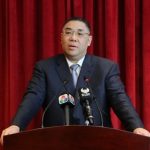 Chief Executive, Mr Chui Sai On, speaks to reporters.
Chief Executive, Mr Chui Sai On, speaks to reporters.
The Government would form a taskforce with the authorities of Jiangsu Province, to study the establishment of a planned Jiangsu-Macao industrial zone, said the Chief Executive, Mr Chui Sai On. Mr Chui made the comments this morning (Tuesday) before he flew to Jiangsu Province for a two-day visit. The trip would explore further cooperation opportunities with Jiangsu Province and help Macao officials gain a better understanding of the economic development achieved by the Province via its industrial zones, Mr Chui told reporters. The Chief Executive disclosed that the two governments had not yet decided on the location of the proposed Jiangsu-Macao industrial zone and what forms such cooperation might take. Forming a taskforce would allow for scientific study of such issues before further moves were made, he added. Both governments were working closely in order to strengthen mutual cooperation, including via enhancement of existing cooperation mechanisms, Mr Chui said. Jiangsu occupies a leading position in the country’s development of industrial zones. Mr Chui gave as an example Jiangsu’s successful development of the China-Singapore Suzhou Industrial Park. Jiangsu-Macao cooperation would advance Macao’s efforts to achieve the goal of moderate economic diversification, he said. It would also help Macao to integrate further in the whole country’s development, by making use of Macao’s special role and advantages. With the support from the Central Government and regional authorities across the country, Macao would deepen regional cooperation, including that relating to Guangdong and Macao, and to development opportunities arising from the Pan-Pearl River Delta region. Mr Chui also commented on the recent proposal by the State Council to optimise the facilitated individual travel scheme, whereby visitors from the mainland are able to travel independently to Macao and Hong Kong. He said maintaining the quality of life of the residents and maintaining for tourists a pleasant experience while they are visiting in Macao were key principles of the Government’s tourism policy. The Government had been conducting an annual review of the city’s capacity to accommodate tourists, so as to improve the application of such tourism policy principles, said Mr Chui. The Government would coordinate resources for the long-term development of Macao’s tourism sector, rather than pursuing short-term growth of visitor numbers, he stressed. Regarding other matters, Mr Chui said the Government was working closely with the authorities in Guangdong in seeking a solution to a shortage of sand for construction. Since 20 March, supply of such material to Macao from the mainland had been suspended. This suspension was in order to maintain sufficient supplies for the construction of the Hong Kong-Zhuhai-Macao Bridge. The Government would strive to cope with any delay to land reclamation work in Macao related to the sand supply issue for the new urban zone known as Area A, he said. The Chief Executive was asked by reporters about the Government’s plan for a centre to monitor and control infectious diseases in order further to protect public health. He said the building housing the centre would have facilities in line with the World Health Organization’s standards. He added the Government was considering inviting experts and scholars from overseas to provide the public with more information regarding the equipment and measures used in similar centres around the world, and that have proved effective elsewhere in containing and controlling diseases and viruses. Such information sharing would be a way to ease concerns among those people living near the new building. Mr Chui additionally said the Government was now working on an update to the mechanisms used to calculate cash premiums payable for Government-issued land concessions. This update process was in accordance with the terms of the new Land Law, which came into force on 1 March, 2014. It requires such mechanisms to be reviewed and updated every two years. Regarding the work of Macao’s Urban Renewal Committee, the Chief Executive said he would suggest a summary of proceedings be issued to the public after each meeting, as a way to help local people better understand the work of the Committee.


